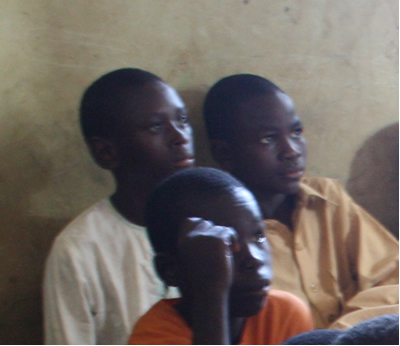Best of Both Worlds – Integrating Traditional Islamic and Modern Secular Education in Northern Nigeria (kano)
“I come to this school for life success”, says twelve year old Nura at the recently established Faragia Model School in Kano State, Northern Nigeria. Nura and his classmates crowd the small classroom provided by the local community, all eager to share in a basic education that provides literacy and numeracy, Hausa (the local language) and Social Studies. This is a first for Nura, who has never attended a government primary school. At another similar new school in Kano state, Daho Community School in Albasu, Mohammed Adamu speaks proudly of his son’s progress “He can now write and read his alphabets and numbers and can even write his name and tell the time. He is doing all these things in less than two months”.
For most of the week Nura and his friends attend a Tsangaya school, one of the 23,000 schools in Kano State (over 75% of all schools) that provide an Islamic education. Students in the Tsangaya schools traditionally move away from home to study the holy Qur’an with a Malam (religious leader). “I like to learn religion”, says Nura. But many Malams and Traditional Rulers across the North are also conscious of the benefits of a modern, secular education - especially in the job market. They also recognise that with even basic literacy and numeracy a child is more likely to thrive and contribute to society. “I want to learn so I can help my parents and my village and the country”, declares Nura.
And with Tsangaya schools reliant on the support of the local community to maintain the students, teacher and the school, this has led to a growing issue of children begging for survival, especially in the cities. Here they become vulnerable to crime and other hazards of life on the streets. An estimated 2 million such “Almajari” youngsters in Kano growing in to poor, unemployed, homeless and disillusioned young adults is recognised as a serious social problem.
UKaid’s Education Sector Support Programme in Nigeria (ESSPIN) is working with government and communities to integrate modern secular and traditional Islamic education in northern Nigeria. Ideological resistance to “westernization” is being reconsidered as a result of an innovative approach that combines thorough analysis with dialogue and growing mutual trust. Under this experimental engagement, Faragia Model School and Daho Community School are two of 28 schools each set up to offer part-time modern basic education to children from four or five local Tsangaya schools – nearly 1,000 children in all. ESSPIN supports the training of the community teachers and supervisory and support teachers, and provided initial resources to establish the schools.
Empowering communities with the choice of an education system that best meets their needs has brought support for changes to which they may have been traditionally opposed. It has also brought extra resources with the classroom and new teachers provided by the community and funds found for maintenance. Malams, teachers, parents and community members form School Support Committees to monitor progress and performance. As Mohammed Adamu notes, “We should all do the little we can to help this programme grow. You see that mosque over there? It was built by the community from a piece of land someone donated. The same efforts can be applied to this school if the community becomes aware of the benefits of integrating the two types of schooling.”
Work with Islamic schools is only part of our education sector work in Nigeria. ESSPIN’s six-year programme (2008 – 2014) in Jigawa, Kaduna, Kano, Kwara, Enugu and Lagos states is improving teaching and management skills in schools and the governance of education at State and Federal level. Support for schools is accompanied by support for communities, and support for Federal, State and Local government to develop effective policies, planning, financing and delivery systems that will improve the quality of basic education for Nigeria’s 32 million primary school aged children (8 million of which don’t go to school).

Nura (in white) and class mates at Faragia Model School in Kano State, Northern Nigeria